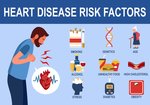Clear, 72°
Wind: mph,


February is American Heart Month. So, in honor of the 59th year the U.S. has shined a spotlight on heart disease — the No.1 cause of death nationwide — here are simple ways you can prioritize your heart health.
About one-third of heart attack patients never make it to the hospital.
“The heart doesn’t get enough blood, or the heart goes into a funny rhythm,” said Dr. Kelly Miller, a physician at University of Maryland Baltimore Washington Medical Center (UM BWMC).
According to an October 2022 report from the Anne Arundel County Department of Health, heart disease was the county’s leading cause of death in 2020, the most recent year for which data is available. Heart disease was responsible for 1,044 deaths, while the second-leading cause of death, cancer, took 1,022 lives.
Physicians at UM BWMC are urging the public to recognize warning signs for heart attacks and other cardiovascular diseases and to call 911 if an emergency occurs.
Miller, one of those physicians, has been saving lives since 2007. She treats acute coronary issues, heart attacks, rhythm disturbances and patients referred for procedures. Sometimes, stents or bypass surgery are required. Other times, patients are prescribed medications if their arteries are blocked in multiple places.
She said people should be aware of several risk factors: family history, smoking, diabetes, cholesterol levels and age. Men should be especially mindful of the risk factors as they reach age 50, and women should more closely monitor these factors as they reach age 60.
If a coronary issue is detected, patients may need to improve their diet, stop smoking and exercise more often.
Dr. Ratnakar Mukherjee, another UM BWMC physician, said people need lifestyle modifications, not a wholesale dietary regimen. He advises patients to avoid most carbohydrates and find healthy alternatives when eating and cooking — for example, substituting margarine for olive oil.
Miller doesn’t follow the philosophy that only red meat is detrimental for overall health.
“I recommend a plant-based diet, and limiting animal protein, if patients are really high risk [for heart disease],” she said. “I don’t know about the idea that it’s OK if it’s not red meat. Meat is probably meat is meat.”
She suggests a Mediterranean-style diet with olive oil, vegetables, nuts, seeds and grains.
“The worst things are processed, like hot dogs and ham,” she added.
Diet alone is not enough for maintaining a healthy heart. Miller agreed that 30 minutes of exercise five times per week is a good fitness benchmark.
For older patients, she recommends strength training in addition to cardio.
“I strongly recommend weight training because as you lose muscle mass, it helps keep the metabolic rate up, and reduces falls and fractures,” she said.
Both doctors stressed that patients should listen to their bodies, consult their primary care physicians and request a stress test if necessary. If patients are smokers, diabetics, sedentary or obese, they may need medical therapy or long-term medications like beta blockers and cholesterol medications.
If a heart-related emergency does happen, people should call 911 and wait for an ambulance instead of driving. Emergency medical technicians can send electrocardiogram (EKG) images to the hospital while the patient is on the way, preparing the emergency room. That way, the hospital will get notified in advance and begin preparing for the patient’s arrival.
“Heart attacks are random events,” Miller said. “There is chest discomfort, but not everyone uses the word ‘pain.’ It can be pressure or a severe tightness … anywhere from your chin to your upper abdomen. It doesn’t always radiate to the left arm.”
Mukherjee agreed.
“It can be neck pain, jaw pain or a toothache,” he said. “They think, ‘Oh, I just pulled a muscle,’ and instead they had an arrhythmia and dropped dead.”
Comments
No comments on this item Please log in to comment by clicking here